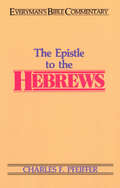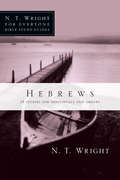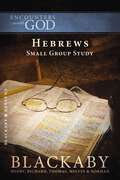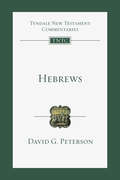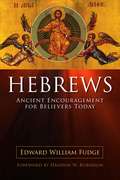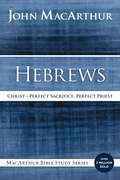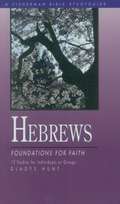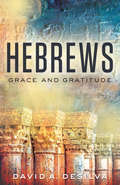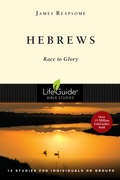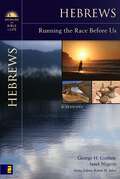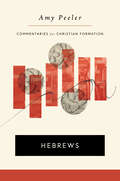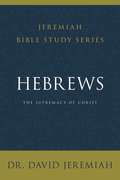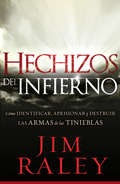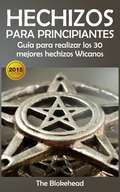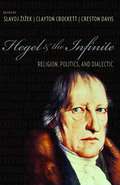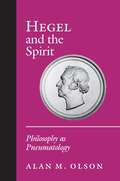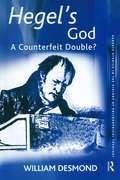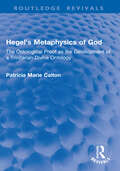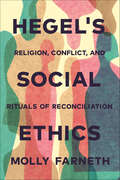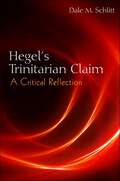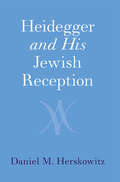- Table View
- List View
Hebrews- Everyman's Bible Commentary (Everyman's Bible Commentaries)
by Charles PfeifferThe emphasis of Hebrews was born out of the concern of the writer for those who had been true to Christ in the past but who were now wavering. Signs of defection from the faith brought both a warning against apostasy and a fervent exhortation to press onward to spiritual maturity. The epistle argues that the death of Christ renders obsolete the Old Testament sacrificial system and presupposes thorough familiarity with that system by those to whom the epistle is addressed. This strong appeal to the Old Testament Scriptures opens up new avenues of thought for appreciation for the unity of the two Testaments.Dr. Pfeiffer's helpful commentary on this profound New Testament book systematically covers each passage while singling out difficult phrases and verses for special attention. This Everyman's Bible Commentary is based upon the scriptural text as found in the King James Version.
Hebrews: 13 Studies For Individuals Or Groups (N. T. Wright for Everyone Bible Study Guides)
by N. T. Wright Patty PellFor many Jewish Christians of the first century, living in the light of the gospel was challenging. Having accepted Jesus as the long-awaited Messiah, they were regarded by still-skeptical family, friends and neighbors as dangerous, misguided and even disloyal to all that God had said earlier on. The letter to the Hebrews was written to show that you can't go back to an earlier stage of God's purposes but must press on eagerly to the one that is yet to come. In these studies by Tom Wright we find encouragement and assurance that pressing on, even in the face of such close and constant pressure to fall back, is its own reward.
Hebrews: A Blackaby Bible Study Series (Encounters with God)
by Norman Blackaby Henry Blackaby Richard Blackaby Melvin Blackaby Tom BlackabyLet five premier teachers of God's Word lead you to a closer, more intimate understanding of God's message to His people. Intended as companions to the Blackaby Study Bible, these guides also stand alone as a complete study of a book of the Bible. The lessons include: Leader's Notes 7 studies based on reference materials included in the Blackaby Study Bible An explanation and interpretation of Scripture A story that illustrates the passage in focus Other Bible verses related to the theme Questions for reflection Suggestions for application in everyday life.
Hebrews: An Introduction and Commentary (Tyndale New Testament Commentaries #Volume 15)
by David G. PetersonThe letter to the Hebrews provides an amazing combination of warnings and assurances to encourage Christians to persevere in faith, hope, and love. The basis for this is a profound reflection on the person and work of Christ, viewed as the fulfilment of Old Testament Scripture. In this Tyndale commentary, David G. Peterson shows how the author expounds the implications of the gospel with pastoral insight and sensitivity, producing a "word of exhortation" that reaches across the centuries to speak to our lives today. The Tyndale Commentaries are designed to help the reader of the Bible understand what the text says and what it means. The Introduction to each book gives a concise but thorough treatment of its authorship, date, original setting, and purpose. Following a structural Analysis, the Commentary takes the book section by section, drawing out its main themes, and also comments on individual verses and problems of interpretation. Additional Notes provide fuller discussion of particular difficulties. In the new New Testament volumes, the commentary on each section of the text is structured under three headings: Context, Comment, and Theology. The goal is to explain the true meaning of the Bible and make its message plain.
Hebrews: Ancient Encouragement for Believers Today
by Edward William FudgeIntended for preachers, university and seminary students and adult Bible class teachers, Hebrews: Ancient Encouragement for Believers Today is a "bridge" commentary -- delivering the best insights of contemporary scholarship in understandable, non-technical language. Edward William Fudge shows that the author of Hebrews used four Psalms as a framework to re-tell the story of Jesus to a disheartened audience that was tempted to walk away. The same structure and intense focus on Jesus permeates and empowers this narrative commentary, bringing fresh encouragement to believers today.
Hebrews: Christ: Perfect Sacrifice, Perfect Priest (MacArthur Bible Studies)
by John F. MacArthurPastor John MacArthur will take you through the book of Hebrews, passage by passage, so that you can better understand the author's message, the cultural context, and the perfect sufficiency of Christ.The early Jewish believers had come from a background of legalism and works. When God came to earth in human flesh as the New Covenant, these believers discovered the freedom they could have in Jesus and the relationship they could enjoy with Him. Yet in the midst of persecution and rejection, they were often tempted to hold on to the former symbols, rituals, and traditions grounded in the requirements of the Old Covenant.The unknown author of Hebrews sought to address this problem by contrasting the Old and New Covenants, brilliantly showing that Christ is higher than any Old Testament character, priest, ritual, or sacrifice. Because of Jesus' life, death, and resurrection, He is the perfect sacrifice and our own High Priest. And He has given all believers unfettered access to God!—ABOUT THE SERIES—The MacArthur Bible Study series is designed to help you study the Word of God with guidance from widely respected pastor and author John MacArthur. Each guide provides intriguing examinations of the whole of Scripture by examining its parts and incorporates:Extensive, but straight-forward commentary on the text.Detailed observations on overriding themes, timelines, history, and context.Word and phrase studies to help you unlock the broader meaning and apply it to your life.Probing, interactive questions with plenty of space to write down your response and thoughts.
Hebrews: Foundations for Faith (Fisherman Bible Studyguide Series)
by Gladys HuntFind Reality in Jesus ChristGod's people in the Old Testament experienced only shadows of the truth about sin and salvation; their perception was dim and incomplete. But Jesus, with his once-for-all perfect sacrifice, brings the blurred shadows into focus and allows us crystal-clear understanding of God's reality. In showing us the way to please God, the writer to the Hebrews contrasts Old Testament sacrifices with the abundant, life-changing grace available in Jesus Christ. 13 sessions for individuals or groupsFisherman Bible Studyguides include: . Penetrating questions that generate discussion. Flexible format for group or individual needs. Helpful leader's notes. Emphasis on daily application of Bible truthFrom the Trade Paperback edition.
Hebrews: Grace and Gratitude (Hebrews)
by David A. deSilvaThe Book of Hebrews helps us see the connection between God’s grace in our lives and the call to invest ourselves in God’s mission in the world. In doing so, we express gratitude for the salvation we have received and respond to God’s grace by being faithful to the One who delivers us.In Hebrews: Grace and Gratitude, author and New Testament scholar David deSilva takes you through a study of Hebrews, tracing the themes of grace and gratitude through this unique New Testament book. In the Book of Hebrews, you will discover a bold perspective on who Jesus is and what he has done, as well as a powerful reflection on the meaning and significance of his death and resurrection in light of the Old Testament. As you read and study this letter, you will receive a deeper appreciation for the salvation we have received through Christ and hear afresh God’s call to a life of gratitude and faithfulness.Additional components for a six-week study include a DVD featuring David deSilva and a comprehensive Leader Guide.
Hebrews: Race to Glory (LifeGuide Bible Studies)
by James Reapsome"What's the use?" At times of frustration or disappointment, it is tempting to ask this question. You work and work to grow to Christian maturity, but you seem to get nowhere—repeating your mistakes, neglecting your commitments, losing your motivation. The original readers of Hebrews felt the same way! Yet the writer of this New Testament letter cheers for them to stay on track and never quit, so they can reach the finish line by the power of Jesus Christ. As James Reapsome leads you through thirteen LifeGuide Bible studies in Hebrews, he offers you—and all of today's faith-weary Christians—the encouragement you need to stay in the faith-race. This LifeGuide Bible Study in IVP's revised format features questions for starting group discussions and for meeting God in personal reflection, as well as a new "Now or Later" section following each session to help you act on what you learn. For over three decades LifeGuide Bible Studies have provided solid biblical content and raised thought-provoking questions—making for a one-of-a-kind Bible study experience for individuals and groups. This series has more than 130 titles on Old and New Testament books, character studies, and topical studies. PDF download with a single-user license; available from InterVarsity Press and other resellers.
Hebrews: Running the Race Before Us (Bringing the Bible to Life)
by Karen H. Jobes Janet Nygren George H. GuthrieA series of Bible study guides following the format and content of the NIV Application Commentaries Series. Each study looks at the original meaning, bridging contexts, and contemporary significance of the text, and offers small group participants a better understanding and relevant application of the biblical material to their daily lives.
Hebrews: The Family Of God In The Epistle To The Hebrews (Commentaries for Christian Formation (CCF))
by Amy PeelerHow can the Letter to the Hebrews help Christians grow in their faith? The Letter to the Hebrews tells us that God is trustworthy—that we can trust in Jesus&’s defeat of death to lead us to eternal life. Complicating this crucial message, the letter&’s enigmatic origins, dense intertextuality, and complex theological import can present challenges to believers wrestling with the text today. Amy Peeler opens up Hebrews for Christians seeking to understand God in this learned and pastoral volume of Commentaries for Christian Formation. Her fresh translation and detailed commentary offer insights into Christology, the relationship between Judaism and Christianity, and the letter&’s canonical resonances. She pays special attention to how the text approaches redemption, providing consolation for the anxious and correction for the presumptuous. Peeler explains the letter&’s original context while remaining focused on its relevance to Christian communities today. Pastors and lay readers alike will learn how Hebrews helps them know, trust, and love God more deeply.
Hebrews: The Supremacy of Christ (Jeremiah Bible Study Series)
by Dr. David JeremiahChrist is faithful...Follow Dr. Jeremiah through the book of Hebrews in a chapter-by-chapter study that will help you understand what it meant to the people at the time it was written, and what it means to Christians today. The letter to the Hebrews is powerful account of Christ's supremacy and faithfulness.The unknown author of Hebrews draws on his expansive knowledge of the Old Testament Scripture to reveal how Jesus is superior to anything the old law had to offer—how Jesus accomplished what the old covenant could not by offering himself as the one and perfect sacrifice to atone for the sins of his people.Each of this study's twelve lessons is clearly organized to include:Getting Started: An opening question to introduce you to the lesson.Setting the Stage: A short reflection to explain the context of the study.Exploring the Text: The Scripture reading for the lesson with related study questions.Reviewing the Story: Questions to help you identify key points in the reading.Applying the Message: Questions to help you apply the key ideas to their lives.Reflecting on the Meaning: A closing reflection on the key teachings in the lesson.—ABOUT THE SERIES—The Jeremiah Bible Study Series captures Dr. David Jeremiah's forty-plus years of commitment in teaching the Word of God. In each study, you'll gain insights into the text, identify key stories and themes, and be challenged to apply the truths you uncover to your life. By the end of each study, you'll come away with a clear and memorable understanding of that Bible book.Each study also contains a Leader's Guide.
Hechizos del infierno: Cómo identificar, llevar cautivas y disipar las armas de la oscuridad
by Jim Raley¿Estamos viviendo en un mundo hechizado?Cuando pensamos en hechizos, la imagen que resalta en nuestra mente a menudo tiene más que ver con las fábulas que aprendimos de niños. Una mujer vieja y fea con un sombrero puntiagudo recitando conjuros en un caldero hirviendo. La realidad, sin embargo, es mucho más peligrosa. Una vez que tenga acceso a nuestras vidas, Satanás puede manipular, dominar e intimidar a los cristianos, incluso el más fuerte. Hechizos del infierno se basa en los escritos de Pablo a la iglesia de los Gálatas para traerle una nueva conciencia sobre los hechizos y estrategias de Satanás, demostrándole cómo puede liberarse de la influencia de males tales como: · Espíritus controladores· Maldiciones generacionales· Brujería en el hogarEliminando el sensacionalismo y lo espeluznante de la guerra espiritual, Raley le permite identificar, comprender y romper cualquier hechizo que el diablo quiera lanzar contra su vida, su familia y su propósito.
Hechizos para Principiantes Guía para realizar los 30 mejores hechizos Wicanos
by The BlokeheadQuisiera agradecer y felicitarle por adquirir “La guía de Hechizos: Guía de realización de los 30 hechizos más populares Wicanos para principiantes”. Este libro contiene pasos y estrategias probados sobre como puede realizar los diferentes hechizos Wicanos para ayudar a mejorar su estado de vida actual. Desde impulsar su suerte financiera a hacerle más atractivo en cuanto al amor, hay bastantes maneras en las cuales estos hechizos pueden ser utilizados. De hecho, la intención al utilizarlos juega una parte central cuando se trata de su elaboración.
Hegel and the Infinite: Religion, Politics, and Dialectic
by Slavoj Žižek Creston Davis Clayton CrockettCatherine Malabou, Antonio Negri, John D. Caputo, Bruno Bosteels, Mark C. Taylor, and Slavoj Žižek join seven others--including William Desmond, Katrin Pahl, Adrian Johnston, Edith Wyschogrod, and Thomas A. Lewis--to apply Hegel's thought to twenty-first-century philosophy, politics, and religion. Doing away with claims that the evolution of thought and history is at an end, these thinkers safeguard Hegel's innovations against irrelevance and, importantly, reset the distinction of secular and sacred. These original contributions focus on Hegelian analysis and the transformative value of the philosopher's thought in relation to our current "turn to religion. " Malabou develops Hegel's motif of confession in relation to forgiveness; Negri writes of Hegel's philosophy of right; Caputo reaffirms the radical theology made possible by Hegel; and Bosteels critiques fashionable readings of the philosopher and argues against the reducibility of his dialectic. Taylor reclaims Hegel's absolute as a process of infinite restlessness, and Žižek revisits the religious implications of Hegel's concept of letting go. Mirroring the philosopher's own trajectory, these essays progress dialectically through politics, theology, art, literature, philosophy, and science, traversing cutting-edge theoretical discourse and illuminating the ways in which Hegel inhabits them.
Hegel and the Infinite: Religion, Politics, and Dialectic (Insurrections: Critical Studies in Religion, Politics, and Culture)
by Creston Davis Slavoj Clayton Crockett Eds. iekCatherine Malabou, Antonio Negri, John D. Caputo, Bruno Bosteels, Mark C. Taylor, and Slavoj Zizek join seven others—including William Desmond, Katrin Pahl, Adrian Johnston, Edith Wyschogrod, and Thomas A. Lewis—to apply Hegel's thought to twenty-first-century philosophy, politics, and religion. Doing away with claims that the evolution of thought and history is at an end, these thinkers safeguard Hegel's innovations against irrelevance and, importantly, reset the distinction of secular and sacred.These original contributions focus on Hegelian analysis and the transformative value of the philosopher's thought in relation to our current "turn to religion." Malabou develops Hegel's motif of confession in relation to forgiveness; Negri writes of Hegel's philosophy of right; Caputo reaffirms the radical theology made possible by Hegel; and Bosteels critiques fashionable readings of the philosopher and argues against the reducibility of his dialectic. Taylor reclaims Hegel's absolute as a process of infinite restlessness, and Zizek revisits the religious implications of Hegel's concept of letting go. Mirroring the philosopher's own trajectory, these essays progress dialectically through politics, theology, art, literature, philosophy, and science, traversing cutting-edge theoretical discourse and illuminating the ways in which Hegel inhabits them.
Hegel and the Spirit: Philosophy as Pneumatology
by Alan M. OlsonHegel and the Spirit explores the meaning of Hegel's grand philosophical category, the category of Geist, by way of what Alan Olson terms a pneumatological thesis. Hegel's philosophy of spirit, according to Olson, is a speculative pneumatology that completes what Adolf von Harnack once called the "orphan doctrine" in Christian theology--the doctrine of the Holy Spirit. Olson argues that Hegel's development of philosophy as pneumatology originates out of a deep appreciation of Luther's dialectical understanding of Spirit and that Hegel's doctrine of Spirit is thus deeply interfused with the values of Würtemberg Pietism. Olson further maintains that Hegel's Enzyklopdie is the post-Enlightenment philosophical equivalent of a Trinitätslehre and that his Rechtsphilosophie is an ecclesiology. Thus Hegel and the Spirit demonstrates the truth of Karl Barth's observation that Hegel is the potential Aquinas of Protestantism. Exploring Hegel's philosophy of spirit in historical, cultural, and personal religious context, the book identifies Hegel's relationship with Hölderlin and his response to Hölderlin's madness as key elements in the philosopher's religious and philosophical development, especially with respect to the meaning of transcendence and dialectic.
Hegel versus ‘Inter-Faith Dialogue’
by Andrew ShanksThe term 'inter-faith' is a recent innovation in English that has gained significant traction in the discussion of religious diversity. This volume argues that the concept of faiths in the plural is deeply problematic for Christian theology and proposes a Hegelian alternative to the conventional bureaucratic notion of inter-faith dialogue. Hegel pioneered the systematic study of comparative religion. In line with Hegelian principle, Andrew Shanks identifies faith as an inflection of the will towards perfect truth-as-openness. In relation to other religious traditions, this must involve the practice of a maximum xenophilia, or love for the unfamiliar, understood as a core Christian virtue. Shanks's neo-Hegelian theory recognises the potential for God's work in all religious traditions, which may be seen as divine experiments with human nature. This timely book discusses a wide range of interreligious encounters and will be an essential resource for studies in comparative theology and philosophy of religion.
Hegel's God: A Counterfeit Double? (Ashgate Studies in the History of Philosophical Theology)
by William DesmondHegel is widely regarded as one of the major thinkers of the modern era, if not the entire tradition of philosophy. Hegel, like many philosophers, took seriously traditional philosophical perplexities about God, but unlike many modern philosophers he claimed to take the specific characteristic of Christianity into account in his philosophizing. This book presents a new examination, interpretation and critical engagement with Hegel's philosophy of religion, and with his concept of God in particular. William Desmond explores the distinctive stresses of Hegel's approach to God, the influence it has exerted, and the fundamental problems that his approach exhibits.
Hegel's Metaphysics of God: The Ontological Proof as the Development of a Trinitarian Divine Ontology (Routledge Revivals)
by Patricia Marie CaltonOriginally published in 2001, Hegel's Metaphysics of God presents Hegel's response to Kant's claim that metaphysics in general and, in particular, knowledge of God, is beyond the grasp of human knowledge. Calton argues that Hegel uses his version of the ontological proof not only to establish the existence of God, but also to develop a Trinitarian divine ontology. The book opens with a discussion of the traditional version of the ontological proof as it is set out by Anselm in his Proslogium and an analysis of the critiques of this traditional formulation of the proof offered by both Kant and Hegel. However, the main focus of the book concerns Hegel's reformulation of the ontological proof as a description of God's self-expression in the world and of God's attaining complete self-knowledge through human consciousness. Exploring Hegel’s proof as his description of God’s activity of self-expression and self-knowledge, Calton demonstrates that Hegel uses the ontological proof not only to establish that God exists, but also to articulate the Trinitarian structure of God, pointing to conclusions drawn by Hegel that human knowledge of God participates in the life of God by completing the Trinity. The book concludes by explaining the role played by human consciousness in completing the Trinity through the reasoning that takes place in the ontological proof. This book details the development of Hegel's argument for a Trinitarian metaphysics of God and establishes that the structure of Hegel's ontological proof encompasses Hegel's entire philosophical system, from the concept of God, to God’s self-expression in finitude, and, finally, to the recognition on the part of human consciousness that humans are an integral part of God’s being.
Hegel's Phenomenology of Spirit
by Ludwig Siep Daniel SmythHegel only published five books in his lifetime, and among them the Phenomenology of Spirit emerges as the most important but also perhaps the most difficult and complex. In this book Ludwig Siep follows the path from Hegel's early writings on religion, love and spirit to the milestones of his 'Jena period'. He shows how the themes of the Phenomenology first appeared in an earlier work, The Difference between Fichte's and Schelling's Systems of Philosophy, and closely examines the direction which Hegel's thought took as he attempted to think through the possibility of a complete system of philosophy. The themes encompassed by the Phenomenology – anti-dualistic epistemology, autonomy, historicality, the sociality of reason – are thoroughly discussed in Siep's subtle and elegantly argued assessment, which appears here in English for the first time. It will be of great interest to all readers studying Hegel's thought.
Hegel's Phenomenology of Spirit (Studies in Phenomenology & Existential Philosophy)
by Martin HeideggerThe text of Martin Heidegger's 1930-1931 lecture course on Hegel's Phenomenology of Spirit contains some of Heidegger's most crucial statements about temporality, ontological difference and dialectic, and being and time in Hegel. Within the context of Heidegger's project of reinterpreting Western thought through its central figures, Heidegger takes up a fundamental concern of Being and Time, "a dismantling of the history of ontology with the problematic of temporality as a clue." He shows that temporality is centrally involved in the movement of thinking called phenomenology of spirit.
Hegel's Social Ethics: Religion, Conflict, and Rituals of Reconciliation
by Molly FarnethHegel’s Social Ethics offers a fresh and accessible interpretation of G. W. F. Hegel’s most famous book, the Phenomenology of Spirit. Drawing on important recent work on the social dimensions of Hegel’s theory of knowledge, Molly Farneth shows how his account of how we know rests on his account of how we ought to live.Farneth argues that Hegel views conflict as an unavoidable part of living together, and that his social ethics involves relationships and social practices that allow people to cope with conflict and sustain hope for reconciliation. Communities create, contest, and transform their norms through these relationships and practices, and Hegel’s model for them are often the interactions and rituals of the members of religious communities.The book’s close readings reveal the ethical implications of Hegel’s discussions of slavery, Greek tragedy, early modern culture wars, and confession and forgiveness. The book also illuminates how contemporary democratic thought and practice can benefit from Hegelian insights.Through its sustained engagement with Hegel’s ideas about conflict and reconciliation, Hegel’s Social Ethics makes an important contribution to debates about how to live well with religious and ethical disagreement.
Hegel's Trinitarian Claim: A Critical Reflection
by Dale M. SchlittHegel's philosophical interpretation of Trinity as a dialectically developing movement of Spirit is one of the most profound readings of Trinity in Western thought. In Hegel's Trinitarian Claim, Dale M. Schlitt provides a careful, detailed presentation of this claim in Hegel's major published works and in his lectures on the philosophy of religion, taking a critical look at how Hegel presents his claim that to think of God as subject and person one must think of God as Trinity. Although agreeing with Hegel's conclusion, Schlitt argues on the basis of an immanent critique of Hegel's thought that Hegel is not able to defend that claim in the way in which he proposes to do so. Schlitt argues instead that Hegel's trinitarian claim can be justified when Spirit is no longer seen as a movement of thought but as a movement of enriching experience. This close analysis provides an excellent point of entry into the wider study and critical consideration of Hegel's systematic philosophical project as a whole. Originally published in 1984 and available now in paperback for the first time, this edition features a new preface and postscript.
Heidegger and His Jewish Reception
by Daniel M. HerskowitzIn this book, Daniel Herskowitz examines the rich, intense, and persistent Jewish engagement with one of the most important and controversial modern philosophers, Martin Heidegger. Contextualizing this encounter within wider intellectual, cultural, and political contexts, he outlines the main patterns and the diverse Jewish responses to Heidegger. Herskowitz shows that through a dialectic of attraction and repulsion, Jewish thinkers developed a version of Jewishness that sought to offer the way out of the overall crisis plaguing their world, which was embodied, as they saw it, in Heidegger's life and thought. Neither turning a blind eye to Heidegger's anti-Semitism nor using it as an excuse for ignoring his philosophy, they wrestled with his existential analytic and what they took to be its religious, ethical, and political failings. Ironically, Heidegger's thought proved itself to be fertile ground for re-conceptualizing what it means to be Jewish in the modern world.
